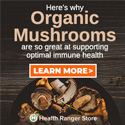
New European food safety guidelines affirm methodology, findings of Seralini's GM corn lab rat study
Thursday, August 22, 2013 by: Ethan A. Huff, staff writer
Tags: food safety guidelines, Seralini study, GM corn
- Newly released JFK files reveal Pentagon's role in creating Lyme disease and covid in the same lab
- Discovery of vast underground city beneath Giza pyramids challenges human history
- Black cumin seed oil emerges as a powerful ally against breast cancer and chronic inflammation
- Sugar-free deception: Artificial sweeteners hijack hunger signals, fuel obesity epidemic, study warns
- Kiss Your Genetic Privacy Good-Bye! 23andMe Gets Green Light to Sell Your Intimate Genetic Details to Anyone They Want
- Aluminum pollution: A silent threat to human health
- Dr. Suzanne Humphries makes bombshell appearance on Joe Rogan podcast, exposing vaccine industry deception back to POLIOMYELITIS
- Sweden's migrant crisis deepens as failed green energy venture leaves thousands jobless, exposes systemic collapse
- Is the vaccine-autism debate reopening? Washington Post sparks controversy with preemptive hit piece on David Geier
- Analysis: The coming economic collapse, a mass uprising and Trump's three secret weapons to halt the growing revolt
- A handful of pecans a day could keep heart disease at bay, study finds
- The mighty Eggplant: An underrated superfood with ancient roots
- Challenging the status quo: “America Fooled” by Timothy Scott exposes the myths about antidepressants
- RFK Jr. slashes HHS bureaucracy, saves taxpayers $1.8B while refocusing on chronic disease epidemic
- The great crypto power struggle: How technocrats and governments are reshaping global finance
- AI breakthrough slashes celiac disease diagnosis time from months to minutes
- Understanding the difference: “Food Allergies and Food Intolerance” by Dr. Jonathan Brostoff and Linda Gamlin
- HIGH-FAT FOOD DEPRESSION: Scientists discover why obesity takes away the pleasure of eating
- Newly released JFK files reveal Pentagon's role in creating Lyme disease and covid in the same lab
- Analysis: The coming economic collapse, a mass uprising and Trump's three secret weapons to halt the growing revolt
- Trump nominates VACCINE ZEALOT Susan Monarez to lead the CDC, sidelining RFK Jr.'s reform efforts
- Trump's greatest betrayal so far: Accelerating Middle East wars, silencing dissent, and serving Zionist masters
- Dr. Mike Yeadon releases 15-minute testimony - WATCH - about genocidal intent of COVID “vaccines”
- Festive flavors: The sweet history, nutritional profile and health benefits of pecan pie
- Elon Musk: Aliens could be here on Earth RIGHT NOW
- Big Pharma's $8 Billion bribery scheme exposed: how doctors are pushed to prescribe junk science, not heal
- 5 Simple steps to boost your brainpower: How to strengthen executive function in a distracted world
- Trump reverses course on Gaza plan, says “nobody is expelling Palestinians”
- A lack of integrity in Academia: Harvard professor found GUILTY of fraudulent research to promote CRT theory
- Reclaim your health: How midlife exercise reverses years of inactivity
- Survival 101: Effective EMF blocking techniques
- Florida takes a stand: DeSantis proposes permanent ban on mRNA vaccine mandates
- Sugarcane extract superior to cholesterol-lowering drugs?
- California's social media censorship law struck down: A victory for free speech or a threat to online safety?
- OpenAI whistleblower who dissented against how the company trained ChatGPT found dead
- EPA advisor admits the agency is funneling billions to climate groups ahead of Trump’s return to White House
- EPA advisor admits the agency is funneling billions to climate groups ahead of Trump’s return to White House
- Newly released JFK files reveal Pentagon's role in creating Lyme disease and covid in the same lab
- California's social media censorship law struck down: A victory for free speech or a threat to online safety?
- Dr. Mike Yeadon releases 15-minute testimony - WATCH - about genocidal intent of COVID “vaccines”
- The Health Ranger releases “Vaccine Zombie” song and music video, using AI-animated zombies for the music video
- The pandemic as a tool for INDOCTRINATION: Understanding “The Indoctrinated Brain” by Dr. Michael Nehls
- Florida takes a stand: DeSantis proposes permanent ban on mRNA vaccine mandates
- “Why we influenced the 2020 elections”: Facebook files reveal the coordinated effort to bury the Hunter Biden laptop story
- Mike Adams releases country western hit single: Goin’ Back in Time is Comin’ Home
- Mike Adams releases music poetry sensation: A Child of God
- Unpacking the Lies That We’ve Been Fed – new song and music video released by Mike Adams, the Health Ranger
- Michigan sheriff announces criminal investigation into 2020 election crimes, Dominion Voting Systems
- Migrants are taking advantage of recent hurricanes to scam residents and loot their homes
- House Intelligence Committee calls for the ARREST and PROSECUTION of Dr. Anthony Fauci
- RFK Jr. clears key hurdle: Sen. Susan Collins backs controversial HHS nominee, signaling a new era for health policy
- Rep. Nancy Mace introduces bill to ban biological males from female facilities on federal property
- Peter Rost exposes Big Pharma corruption in his book “The Whistleblower: Confessions of a Healthcare Hitman”
- Mike Adams releases new song and music video: Nothing More Disgusting Than a Globalist
- Red Cross issues warning to stop blood plasma donations from vaccinated people
- Scientists confirm: GENIUS brain function can be spontaneously unleashed in humans without any apparent cause
- EPA advisor admits the agency is funneling billions to climate groups ahead of Trump’s return to White House
- HYSSOP: What research reveals about the health benefits of this ancient holy herb
- Two containers with completed ballots fall out of truck in Florida
- Fully vaccinated about to see “tsunami” of illness and death, warns virologist
- Global leaders unite to clamp down on “misinformation” with UN-backed Cascais Declaration
- BREAKING: 2025 NDAA authorizes mandatory military draft of WOMEN across America… as Pentagon pursues global NUCLEAR war with both Russia and China at the same time
- Michael Yon warns of a ZIONIST TAKEOVER in Trump’s second administration
- BOMBSHELL: DNA testing kits are a SCAM to develop ethnic-specific bioweapons
- Ozempic and Wegovy weight loss drugs are injectable LIZARD VENOM PEPTIDES that may unleash a devastating wave of organ failure… side effects align with symptoms of SNAKE BITES
- Israeli soldiers accused of even more torture and abuse in the West Bank
- These 13 countries just signed an agreement to engineer a global FAMINE by destroying food supply
- NASA admits that climate change occurs because of changes in Earth’s solar orbit, and NOT because of SUVs and fossil fuels
- RFK Jr. clears key hurdle: Sen. Susan Collins backs controversial HHS nominee, signaling a new era for health policy
- Sermon 30: How Jesus reveals Caesar’s FAKE CURRENCY and FALSE AUTHORITY
- Coriander seeds: Ancient medicine backed by modern science
- Arizona officials claim Maricopa County needs 10-13 days to tabulate results of the election
As reported by GMOSeralini.org, the EFSA's indirect approval of Prof. Seralini's study comes as the agency issues new guidelines for how long-term feeding studies are to be conducted in the European Union (EU) moving forward. Believe it or not, the EFSA, which is essentially Europe's version of the U.S. Food and Drug Administration (FDA), is modeling these guidelines after the very same ones that Prof. Seralini used to show that GMOs cause organ failure and cancer.
As you may recall, the EFSA came out like an attack dog following the publishing of Prof. Seralini's controversial study back in 2012, claiming that he failed to apply appropriate research methodology in his work. As previously pointed out by GMWatch.org, these claims were completely unfounded and hypocritical, as none of the industry-backed safety studies used by the EFSA to approve GMOs applied these standards, either.
But now the EFSA is essentially admitting that Prof. Seralini was right all along, and that his research methods are, in fact, more robust than currently accepted methods. So, the agency is adopting many of them and making them official standards for modern food safety research, which is a major victory not only for Prof. Seralini's work, but also for the entire independent research community that seeks truth rather than corporate propaganda.
"This is a fascinating document which largely validates the methodology and choices of Prof. Gilles-Eric Seralini in his 2012 study on GM maize NK603 -- methodology and choices that EFSA and countless other critics previously attacked him for," explains GMOSeralini.org about the release of the EFSA's new guidelines.
You can review these new guidelines for yourself by visiting:
http://www.efsa.europa.eu/en/efsajournal/pub/3347.htm
EFSA affirms almost every research method used by Seralini
Some highlights from the new EFSA guidelines include a pronouncement that the type of rat species used by Prof. Seralini, the Sprague-Dawley (SD) rat, is, indeed, appropriate for use in long-term food safety studies. Prof. Seralini had previously been criticized for using SD rats in his study, but according to the EFSA, SD rats are fitting for this type of research.The EFSA also now agrees that long-term food safety studies do not necessarily need a narrow and fixed hypothesis, another criticism that was levied against Prof. Seralini's work. Since GMOs themselves are still technically a novelty as far as the scientific literature is concerned, constructing studies in a more "exploratory" fashion, just like Prof. Seralini did, is completely acceptable.
The new EFSA guidelines do much more than just exonerate Prof. Seralini's work, however. They also take aim at the misguided use of historical controls in safety testing, a practice often used by Monsanto and others to essentially arrive at pre-determined outcomes. According to the EFSA, historical control data "should be considered with caution," as it can lead to false outcomes.
"Overall, we're pleased to see EFSA taking on board our cautionary lessons on spurious 'reference' control groups and historical control data (even if in the same document EFSA subsequently allows the use of both), as well as validating the aspects of Seralini's experiment that he was most criticized for."
You can read a review of the major points of the EFSA's new guidelines by visiting:
http://gmoseralini.org
Sources for this article include:
http://gmoseralini.org
http://www.gmwatch.org
http://www.efsa.europa.eu
http://science.naturalnews.com
Food safety guidelines at FETCH.news
Get independent news alerts on natural cures, food lab tests, cannabis medicine, science, robotics, drones, privacy and more.
Take Action: Support Natural News by linking to this article from your website
Permalink to this article:
Embed article link: (copy HTML code below):
Reprinting this article:
Non-commercial use OK, cite NaturalNews.com with clickable link.
Follow Natural News on Facebook, Twitter, Google Plus, and Pinterest
Science News & Studies
Medicine News and Information
Food News & Studies
Health News & Studies
Herbs News & Information
Pollution News & Studies
Cancer News & Studies
Climate News & Studies
Survival News & Information
Gear News & Information
News covering technology, stocks, hackers, and more



"Big Tech and mainstream media are constantly trying to silence the independent voices that dare to bring you the truth about toxic food ingredients, dangerous medications and the failed, fraudulent science of the profit-driven medical establishment.
Email is one of the best ways to make sure you stay informed, without the censorship of the tech giants (Google, Apple, Facebook, Twitter, YouTube, etc.). Stay informed and you'll even likely learn information that may help save your own life."
–The Health Ranger, Mike Adams













































